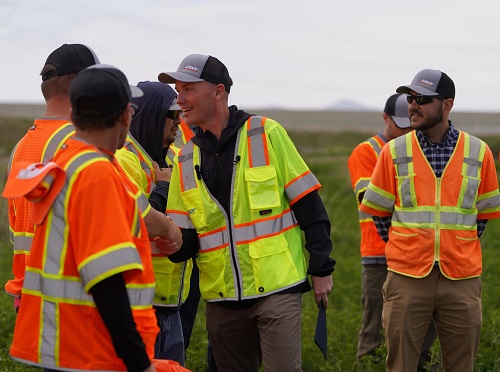The Utah Department of Transportation recently launched a new volunteer litter removal program called “Keeping Utah Beautiful” – a program designed to make it easy for members of the public to go online and sign up for a one-time cleanup of state roads.
[Above photo by the Utah DOT]
The agency said these volunteer cleanups will supplement the work of Utah DOT crews who regularly pick up litter statewide. To ensure volunteer safety, “Keeping Utah Beautiful” participants will not clean interstates or some state routes, the Utah DOT stressed – and requires that program volunteers be a minimum of age 14.
The “Keeping Utah Beautiful” program replaces the agency’s Adopt-a-Highway program, though Utah businesses can continue to support the “Sponsor a Highway” program, which hires a professional litter cleaning company to perform pickup along Utah’s interstates.
Utah Governor Spencer Cox (R) helped launch the new litter removal program by cleaning up a stretch of SR-201 near Mountain View Corridor.
“Serving others and giving back is the hallmark of who we are,” the governor said in a statement. “Utah leads the nation each year in volunteerism, and I know many Utahns, including myself, will take advantage of this new opportunity to help maintain the beauty of our state.”
Utah DOT Deputy Director Lisa Wilson added that her agency’s maintenance workers will continue cleaning up litter from interstates and major state roads alongside volunteer groups; an ongoing effort that costs the department an average of $2.3 million per year.
“Keeping litter off our roads not only keeps Utah beautiful, but it keeps Utah safe,” Utah DOT Deputy Director Lisa Wilson said. “This new program will make it easier than ever for Utahns to lend a hand and clean up our roads.”
State departments of transportation across the country are involved in a wide variety of litter removal efforts, as well as public awareness campaigns that seek to eliminate roadway littering – in no small part due to the growing cost of roadside cleanup efforts.
The Ohio Department of Transportation, for example, note that it is now spending $10 million annually to collect trash along state and U.S. routes outside municipalities and all interstates except the Ohio Turnpike.
In addition to Ohio DOT workers and Adopt-A-Highway groups, litter collection in Ohio is also performed along state highways by the following:
- Ohio Department of Rehabilitation and Corrections – Ohio DOT works with 11 institutions on litter pickup along state highways. Since January, their crews collected over 24,000 bags of trash.
- Interstate Business Solutions – Ohio DOT contracts with them to clean up litter in the state’s metropolitan areas (Columbus, Cleveland, Cincinnati, Toledo, Akron, Canton, and Youngstown). Since January, the IBS team has collected over 31,343 bags of trash.
- Center for Employment Opportunities – Ohio DOT contracts with CEO to pick up along roadsides, and to clean encampment areas of unhoused individuals. Since January, the CEO team has collected nearly 25,000 bags of trash.
Meanwhile, the Oklahoma Department of Transportation and Missouri Department of Transportation recently wrapped up yearly contests that seek to highlight the issue of roadside littering among elementary through high school aged students.
Oklahoma DOT said the 14 student winners of its 2024 Trash Poster Contest – drawn from a pool of 4,615 entries –receive a monetary award, T-shirt, certificate of recognition, a poster board and a laminated copy of their poster. Additionally, they are awarded sponsor promotional items and a state legislative citation of congratulations.
Concurrently, the Missouri Department of Transportation selected winners of the 2024 “Yes You CAN Make Missouri Litter Free” trash-can-decorating contest.
MoDOT said that it sponsors this contest as part of Missouri’s “No MOre Trash!” campaign to raise awareness about and discourage littering. The competition encourages students from kindergarten through 12th grade to join the fight against litter by decorating and displaying a large trash can with the “No MOre Trash!” logo and a litter-prevention message using a variety of creative art mediums.

